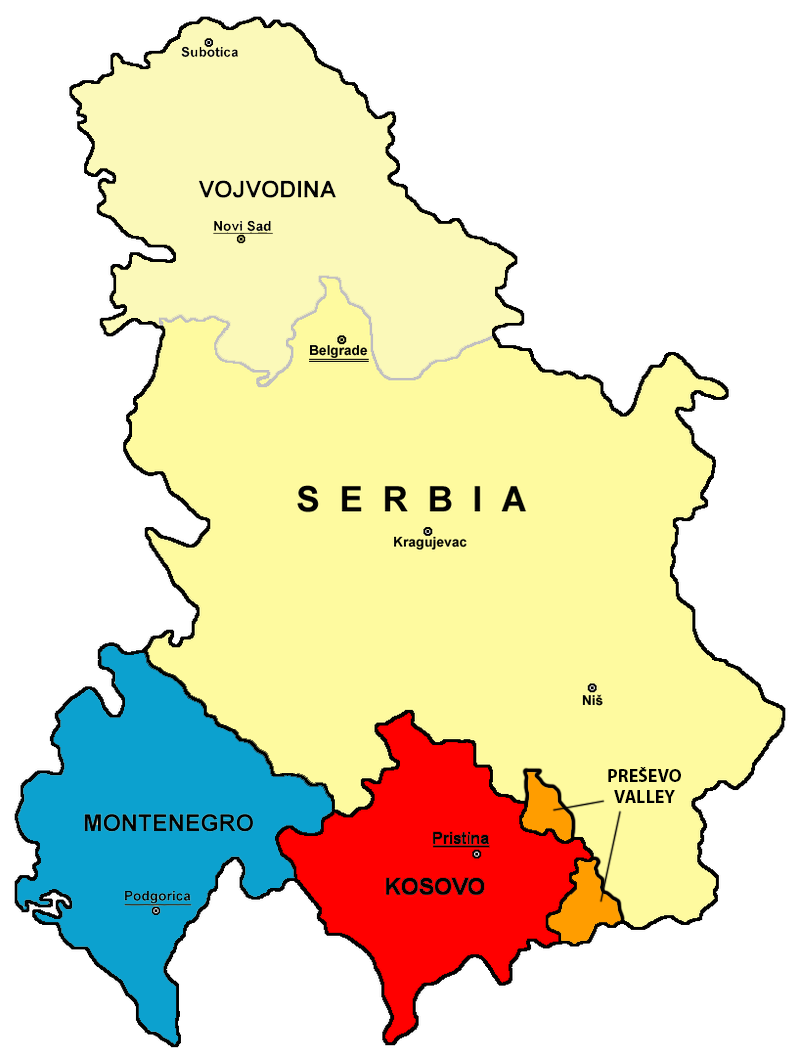Serbo-Kosovar Mediation Falls Through
Map showing the Presevo Valley, which Kosovo would receive in a proposed land-swap with Serbia. In turn, Serbia would receive North Kosovo, which is not pictured. Wikimedia Commons.
A century after World War I and more than two decades after the massacre at Srebrenica, final peace in the Balkans has again been thwarted. Kosovo, a predominantly Albanian region, declared independence from Serbia in 2008 and has received international recognition. Since then, talks of reconciliation between President Aleksandar Vučić of Serbia and President Hashim Thaçi of Kosovo have come to a halt. In the opening weeks of November, both nations acknowledged their “mutual intention” to continue talks on reconciliation.
The situation within Kosovo remains tense, blemished by “frequent adversarial actions” by both sides, notes Zahir Tanin, the special representative of the secretary-general and head of the UN Interim Administration Mission in Kosovo.
The most recent efforts at settlement have been a “landswap” proposal, under which Serbia would retain control of disputed North Kosovo, an area dominated by ethnic Serbs, while Kosovo would take municipalities in the Preševo Valley, a densely populated area unclaimed by Kosovo but populated by ethnic Albanians. Additionally, Serbia would recognize Kosovo’s statehood, and it would enter the UN. The EU-mediated talks remain in “a state of deep conceptual crisis,” observed Vasily Nebenzya, the Russian permanent representative to the UN. He remarked that, while Belgrade was open to mutually agreeable options, Priština prolongs negotiations in hopes that Serbia will bend to external pressures.
Tensions spiked recently following the formation of a Kosovar Army, alarming both the Serbian government and the large Serbian minority in Kosovar territory. This was overshadowed by warnings by Thaçi that, without a peace deal, “Islamists could become more powerful” in Muslim-majority Kosovo. After a subsequent military demonstration in Belgrade celebrating the centenary of World War I and exhibiting Serbia’s martial capacity, both nations have begun to support a solution of “border correction,” essentially forming ethnic states, though many in Europe fear that such a division could reignite conflict between the states.
Russian President Vladimir Putin, during a meeting in Paris with Thaçi, made statements supporting a “peaceful agreement” between Serbia and Kosovo and a normalization of relations. Nonetheless, the Kremlin remains a staunch advocate of Serbia’s agenda in the region. Germany, on the other hand, which favors an autonomous Kosovar government, has expressed fear that partition will spark ethnic conflict once again in Eastern Europe. President Donald Trump, who also met with Thaçi in Paris this month, emphasized the need to reach a “comprehensive” treaty on division of land in an effort to “extend peace and reconciliation” in the Balkans.
With all sides pushing for settlement and normalization in Kosovo and more than 100 countries recognizing the state as independent, it can be expected that the negotiations will continue into 2019.

